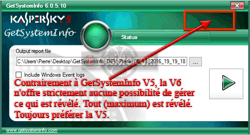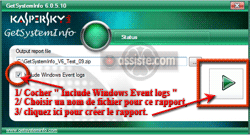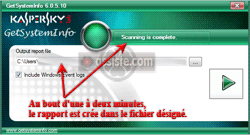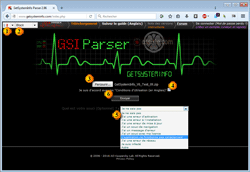Assiste.com
Kaspersky GetSystemInfo V6 : outil libre gratuit. Vérifie la compatibilité d'un ordinateur avec les antivirus Kaspersky. Usage libre. Perte de confidentialité.
cr 01.01.1999 r+ 23.08.2020 r- 08.05.2024 Pierre Pinard. (Alertes et avis de sécurité au jour le jour)
Dossier (collection) : Logiciels (logithèque) |
|---|
| Introduction Liste Malwarebytes et Kaspersky ou Emsisoft (incluant Bitdefender) |
| Sommaire (montrer / masquer) |
|---|
GetSystemInfo V6 (Kaspersky Get System Info V6 - Kaspersky GSI V6) est un utilitaire gratuit de Kaspersky permettant à l'éditeur d'analyser une machine sur laquelle le fonctionnement des outils Kaspersky (antivirus, etc. ...) rencontrerait une difficulté.
Dans certains cas, après l'installation d'un produit de Kaspersky Lab, le système d'exploitation ou le produit peut rencontrer des dysfonctionnements. Ceci peut être lié à un conflit entre l'application et des logiciels ou des pilotes installés dans l'ordinateur.
Dans ces cas le Support Technique de Kaspersky Lab a besoin d'un rapport sur ce dont est fait la machine (matériels et logiciels). C'est ce que fait GetSystemInfo V6 (Kaspersky Get System Info V6 - Kaspersky GSI V6).
La version 6 de GetSystemInfo coexiste avec la version 5. Il y a deux différences :
- L'une, mineure, est que la version 6 nécessite la présence du Microsoft .Net Framework (version 2 minimum). La version 5 ne nécessite rien pour s'exécuter.
- L'autre, majeure, est que la version 6 n'offre aucun réglages. GetSystemInfo V5 et GetSystemInfo V6 sont intrusifs à très intrusifs et font remonter sur les serveurs de Kaspersky (et étalent en public lorsque des liens sont publiés sur des forums), des informations qui devraient rester strictement confidentielles et privées. GetSystemInfo V5 donne la possibilité à l'utilisateur de gérer et moduler les informations transmises, d'un minimum à un maximum. GetSystemInfo V6 ne donne aucune possibilité de contrôle et maîtrise : c'est le maximum, un point, c'est tout. La V6 est juste un « presse bouton ».
En conséquence, puisque les versions 5 et 6 cohabitent, il est vivement recommandé d'utiliser la version 5 pour créer un rapport GetSystemInfo.
Paramétrez et utilisez la version 5 : GetSystemInfo V5.
Toutefois, GetSystemInfo V6 apporte quelque chose que la V5 n'a pas :
La version 6 de GetSystemInfo (GSI)
- Ajoute des rapports additionnels à celui de la version 5
- Supprime les possibilités de réglages de la version 5
Donc, ce qui est dit ci-après complète ce qui est dit pour GetSystemInfo 5 (GSI 5) qui doit être lu préalablement.
GetSystemInfo (GSI) est un utilitaire gratuit de la société Kaspersky.
GetSystemInfo (GSI) est utilisable par tout le monde, bien qu'il soit essentiellement prévu pour aider les techniciens Kaspersky à détecter pourquoi un produit Kaspersky ne fonctionne pas ou fonctionne mal.
Le 10 février 2016, GetSystemInfo (GSI) passe de la version 5 à la version 6
GetSystemInfo (GSI) fait donc remonter de l'information sur une machine en cours d'analyse vers les serveurs de Kaspersky. Ces informations sont analysées et présentées de manière lisible. Il s'agit d'un outil d'aide aux techniciens (appelés « Assistants » ou « Helpers » sur les forums d'entraide à la décontalination).
GetSystemInfo (GSI) n'est pas un outil d'analyse mais un outil d'aide à l'analyse, rien d'autre.
Les résultats de GetSystemInfo (GSI) doivent être interprétés par un technicien. L'utilisateur ne doit pas en tirer la moindre conclusion.
Le but est de faire ressortir rapidement les raisons éventuelles de non fonctionnement des produits Kaspersky. Il ne s'agit pas de décontaminer une machine mais de trouver pourquoi un produit Kaspersky a un problème.
Cette page concerne GetSystemInfo (GSI) version 6.
Depuis le 10.02.2016, GetSystemInfo (GSI) version 6 a été rendu public.
Vous pouvez continuer à télécharger GetSystemInfo (GSI) version 5 depuis notre propre serveur et envoyer le rapport V5 sur le parser de Kaspersky à getsysteminfo.com.
La version 6 ajoute aux rapport de la version 5, les rapports suivants :
Cette page ne porte que sur les différences les plus remarquables d'avec GetSystemInfo (GSI) version 5.
- Les journaux d'événements de Microsoft Windows
- Le rapport de l'antivirus AVZ
- Le rapport statistique "avp.com"
- Les paramètres "avp.com"
- Les caractéristiques des navigateurs installés (principaux navigateurs du marché)
- Journaux d'installation des produits de Kaspersky Lab
- Dump (vidage) mémoire des produits de Kaspersky Lab
- Journaux "KAVRemover"
- Journaux "Kleaner"
- Journaux Microsoft .NET framework
- Journaux de l'API d'installation de Microsoft Windows
- Journaux du serveur de Microsoft SQL
- Les indices de l'outil de mises à jour (Updater)
- Versions des programmes exécutables des produits de Kaspersky Lab
- Informations sur les produits Kaspersky dans le Registre de Microsoft Windows
- Informations sur les services dans le Registre de Microsoft Windows
- Informations sur les paramètres de Microsoft Windows (Panneau de configuration) dans le Registre de Microsoft Windows
Une vue d'ensemble des données suivantes et de leurs consignations est ajoutée :
- Dumps (vidages) mémoire existants des produits de Kaspersky Lab
- Liste des fichiers des produits de Kaspersky Lab dans le répertoire Program Data
- Points de jonctions dans Program Data
Le rapport de l'antivirus AVZ
Très interressante analyse antivirale avec l'antivirus AVZ qui produit un journal additionnel d'analyse de tout ce qui est exécutable et fait ressortir tout ce qui est inconnu, sans porter de jugement (tout ce qui n'est pas dans les bases de données de Kaspersky) :
| Type d'objets analysés | Nombre total d'objets détectés | Nombre total connus (AVZ Trusted Objects Database) (Base de données AVZ des objets de confiance) | Liste détaillée des autres objets (inconnus) |
| Processus | |||
| Modules (Dlls - (Dynamic Link Library) (bibliothèque de liaisons dynamiques) | |||
| Modules systèmes (dans l'espace du noyau de Windows) | |||
| Services | |||
| Drivers (pilotes) | |||
| Autoruns (objets lancés automatiquement) | |||
| Modules d'extension (Add-on) d'Internet Explorer (les BHOs ou Barres d'outils, etc. ...) | |||
| Modules d'extension (Add-on) de l'Explorateur Windows | |||
| Extension du système d'impression (moniteurs, fournisseurs) | |||
| Tâches inscrites dans le Planificateur de tâches | |||
| Réglages FAI (ISP ou SPI - Fournisseur d'accès Internet) / LSP (Label Switched Path) | |||
| Transport protocol providers (TSP, LSP) | |||
| Ports TCP / UDP | Liste de tous les ports avec état, adresse de l'hôte distant, port sur l'hôte distant, application locale utilisant le port | ||
| Downloaded Program Files (DPF) | |||
| Applications du panneau de contrôle | |||
| Active Setup (Dispositifs de mises à jour) | |||
| Fichier Hosts | Tout son contenu | ||
| Protocols and handlers | |||
| Ressources partagées | Liste | ||
| Objets suspicieux | Liste |
Compte tenu de la présentation bien formatée des données sur le matériel et les logiciels constituant une machine, GetSystemInfo (GSI) peut être utilisé par des « Assistants » ou « Helpers », non Kaspersky, sur les forums d'entraide à la décontalination). GetSystemInfo (GSI) fait donc partie, parmi d'autres, des outils permettant l'inventaire du matériel et des composants logiciel.
Ce qui est attendu en fin d'analyse par GetSystemInfo (GSI) :
Outre les divers tableaux présentant les résultats d'anlyse par nature, un tableau de synthèse est la première information qui sera affichée :
- Tableau de synthèse : Suspicions de « choses » pouvant éventuellement être la cause du disfonctionnement des produits Kaspersky.

Kaspersky GetSystemInfo (GSI) - Résultats d'une analyse automatique - Simples potentialités d'incompatibilités - Tableau de synthèse : Tous va bien

Kaspersky GetSystemInfo (GSI) - Résultats d'une analyse automatique - Simples potentialités d'incompatibilités
Mode d'emploi de GetSystemInfo (GSI) - Actions à conduire avant d'utiliser GetSystemInfo (GSI)
Selon les paramètres de conportement qui vont être sélectionnés au paragraphe suivant, de plus ou moins nombreux répertoires vont être balayés. Ils est totalement inutile de perdre son temps à balayer des informations purement temporaires (qui ont vocation à être détruites) et à encombrer les résultats d'analyses de données inutiles.
Avant de lancer GetSystemInfo (GSI), commencer par nettoyer votre disques dur avec :
- Nettoyage de disque (assistant cleanmgr.exe de Windows)
ou - CCleaner (paramétrage en nettoyage disque tout en préservant les options de confort de Windows)
Mode d'emploi de GetSystemInfo (GSI) - Téléchargement de GetSystemInfo (GSI) (version 6.x)
- Téléchargez GetSystemInfo (GSI) n'importe-où sur votre disque dur. Il s'agit d'un fichier compressé (un format appelé « archive », dans ce cas compressé avec l'algorithme 7-Zip) et dont le suffixe est 7z.
Sa taille, pour la version de février 2016 (version 6.1.0.50), est de 8,13 Mo (8 531 251 octets). - Ouvrez l'archive (GetSystemInfo 6.1.0.50.7z) qui va, par défaut, se décompresser dans un sous-répertoire créé dynamiquement dans le répertoire où vous l'avez téléchargé, au nom de GetSystemInfo 6.1.0.50.
Microsoft Windows embarque, nativement, les outils de décompression des fichiers 7-Zip. dont la licence est publique (GNU LGPL) et dont le code est public (Open Source).
Si votre version de Windows ne reconnait pas le format de compression 7-Zip, téléchargez et installez l'utilitaire de décompression gratuit 7-Zip. - Fermez l'outil de décompression, dont on n'a plus besoin.
- Rendez-vous dans le sous-répertoire où a été décompressé GetSystemInfo (GSI). Il n'y a qu'un seul fichier appelé GSI.exe (10,5 Mo (11 032 472 octets)).
- Ouvrez GSI.exe.
- Acceptez obligatoirement les clauses de licence (vous êtes vivement invité à en lire un extrait, plus bas dans cet article, afin de mesurer l'incroyable étendue des données que Kaspersky fait remonter sur ses serveurs).
Mode d'emploi de GetSystemInfo (GSI) Version 6
Contrairement à la version 5 de GetSystemInfo (GSI), la version 6 n'accepte plus aucun réglage.
Les problèmes de fonctionnement des logiciels de la société Kaspersky peuvent être dues à des bugs des produits Kasperski, ou sont, parfois, liés à des conflits d'exécutions simultanées d'autres logiciels. C'est principalement à ces « autres logiciels » que l'assistant s'intéresse pour mettre le doigt sur :
- Incompatibilités connues
- Versions périmées
- Installations de correctifs non effectuées
- Présence de logiciels de partage de fichier (P2P)
- Services et état des « Services » (de Windows ou de vos applications instalées, « démarrés », « désactivés », etc. ...)
- Etc. ...
Eventuellement, changer le nom du rapport qui va être généré (le nom proposé par défaut contient l'identifiant utilisateur, ce qui pose un problème de confidentialité (le rapport qui va être généré contiendra également l'identifiant utiisateur !)).
- Par exemple, C:\GetSystemInfo_01.zip est un bon nom
Le rapport d'analyse est généré.
Puis il est compressé au format 7-Zip
Le fichier contenant le rapport est enfin généré sur le disque dur.
Vous pouvez fermer GetSystemInfo et, éventuellement, ouvrir le rapport.
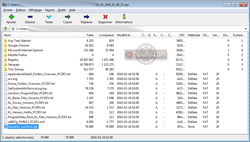
Kaspersky GetSystemInfo (GSI) - Rapport GetSystemInfo V6 - Vue globale des fichiers et sous-répertoires d'un rapport V6
Mode d'emploi de GetSystemInfo (GSI) - Envoie des données collectées sur les serveurs de Kaspersky
Se rendre sur le site http://getsysteminfo.com
- Choisir la langue (par défaut, c'est celle du navigateur Web utilisé)
- Choisir le style de la fenêtre (ici, " Black ")
- Sélectionner le rapport GetSystemInfo à envoyer sur les serveurs de Kaspersky
- Accepter les clauses et conditions (Lire, plus bas, la liste, que vous êtes obligé d'accepter, des informations envoyées)
- Sélectionner la raison de votre envoie de ce rapport pour analyse par les techniciens de Kaspersky
- Envoyer le rapport
Mode d'emploi - Ne rendez jamais public votre journal GetSystemInfo (GSI)
Les informations qui remontent sur les serveurs de Kaspersky
Puisque personne ne lit jamais les contrats avant de les signer, voici la liste des informations que vous acceptez d'envoyer au russe Kaspersky lorsque vous utilisez la version 5 de GetSystemInfo (une version 6 est en bêta tests en février 2016)
5. Information Collection5.1. You agree to provide following information about computer where the Software was launched including following:
- Date and time when data being submitted was gathered;
- Computer details, including:
- BIOS details;
- Central processing unit (CPU) details;
- Win32 Config Manager error codes;
- Printers used, including the number of print tasks since the printing device was restarted last, printer status code at the time of data submission, network or local printer usage ID, Print Processor name, ID showing whether spooling and queuing is supported, name of the print server to which the network printer is connected, ID of printer availability as a shared resource, and name of the shared printing device;
- Video controllers, including device status information, ID of a custom configuration used by the device, values of current device settings and operating mode, date and time of the last device driver modification, video driver version, path to the INF file of the video adapter and section of the INF file with information for the video adapter, name of the installed video device driver, code of architecture and code of the type of video device memory, description of the video processor;
- Video monitors, including the unique monitor ID and device status at the time of data submission;
- Sound cards, including the unique ID of the device, status and state at the time of data submission;
- Logical drives, including description, name of the first class in the inheritance chain, unique ID, type of logical drive, type of file system of the partition, size of free disk space, code of the drive type, name of the logical drive, size of the logical drive, header of the logical drive volume, serial number of the logical drive;
- Network adapters, including adapter name, code of availability and status, ID of the type of network in use, ID showing whether or not an adapter is installed in the system, MAC address of the adapter, name of the adapter vendor, name of the network connection shown to the user, code of the status of adapter connection to the network, estimated current bandwidth in bits per second, adapter status at the time of data submission, date and time of the last adapter reboot, IP address of the gateway used by default, ID of DHCP usage, date and time of expiry of the IP address issued by the DHCP server, date and time of receipt of the IP address from the DHCP server, IP address of the DHCP server, DNS name of the domain to which the host belongs, list of DNS name suffixes added at the end of the host name during domain name resolution, ID of WINS usage, DNS name of the host, list of IP addresses used for DNS requests, ID of IP address registration in the domain, list of IP addresses associated with the adapter, IP Connection Metric data, ID of TCP/IP usage, values of settings and device status;
- Computer name;
- Name of the domain or workgroup to which the computer belongs, code of computer role in the domain or workgroup;
- Information about the computer manufacturer, computer name as specified by the manufacturer, contact details of the computer support service;
- Server Mode activation ID and code of computer usage, computer status at the time of data submission;
- Name of the current user, including the domain or computer name.
- BIOS details;
- OS information, including:
- Boot device and boot type;
- OS version and name, including information about OS service packs installed;
- Country code;
- Operating system description;
- Size of physical memory in use and free physical memory, size of free memory in current pages of the paging file, and size of free virtual memory;
- OS installation date and time;
- Last boot up date and time;
- Local date and time at the moment of data submission;
- OS vendor;
- List of supported languages;
- Number of currently running processes;
- Number of user sessions for which the operating system stores status information at the time of data submission;
- OS architecture ID;
- OS language version installed;
- Paging file size;
- ID of the partition where the OS is installed;
- Full path to system directory;
- Total size of virtual memory and available physical memory.
- Boot device and boot type;
- Information about environment variables.
- Information about Warning or Error system events over the past three days at the time of data submission, including:
- Event subcategory and text name of the subcategory;
- Value of the last 16 bits of the event property;
- Event ID;
- Code of event ID;
- Name of the WinNT event log file;
- Message shown in the event log file and event ID;
- Name of the source to which the event relates;
- Time when the event was generated and time of the event record in the log;
- User name in the system at the time of the event.
- Event subcategory and text name of the subcategory;
- Information about user accounts, including:
- Name of Windows account in the domain;
- Account description;
- Name of the domain to which the account belongs;
- Date and time of account creation;
- ID of the local account attribute;
- User security identifier;
- Security identifier type code;
- Current state of the object.
- Name of Windows account in the domain;
- Information about products installed, including:
- Product name;
- Product removal string;
- Name of product vendor;
- Product version;
- Installation date;
- Full path to product directory;
- Language localization of the product.
- Product name;
- Information about services:
- Name of the file that executes the service;
- Full path to the binary file of the service;
- Unique ID of the service;
- Service type;
- Service process ID;
- ID showing that the service can be suspended or stopped;
- Service description;
- Name displayed by the service;
- ID showing that the service is running;
- Service start mode;
- Name of the account under which the service has been started;
- Current service state;
- Current service status;
- Information about modules used by the service process.
- Name of the file that executes the service;
- Information about registry keys.
- Information about Browser Helper Objects (BHO), including:
- GUID of the object;
- AppID of the object;
- Object name;
- Object file details;
- Thread model;
- Language localization.
- GUID of the object;
- Information about drivers, including:
- ID of the driver device class;
- Name of the device that uses the driver;
- Date of driver creation by the vendor;
- Name of the driver vendor;
- Driver version;
- Driver name;
- Attribute showing that the driver is digitally signed;
- Driver location;
- Current driver status;
- ID of driver's PnP compatibility.
- ID of the driver device class;
- Information about shared folders, including:
- Alias of the full path to a shared folder;
- Local path to a folder;
- Description;
- ID of the limitation on the number of simultaneous connections to the folder;
- Current status of access to the directory.
- Alias of the full path to a shared folder;
- Information about open ports:
- Protocol ID (TCP or UDP);
- ID of the process that uses the port to establish a connection;
- IP addresses and numbers of open ports of the connection parties;
- Connection status.
- Protocol ID (TCP or UDP);
- Information about executable files on the computer, including:
- Value of %TEMP% variables;
- Full path to the folder without the use of environment variables;
- Information about executable files in the folder:
- File name;
- Version of the product to which the file relates;
- File version;
- File type;
- Name of the file directory;
- File size on disk;
- Size of a compressed file on disk (if the file is compressed);
- File creation date;
- File modification date;
- Date when the file was accessed last;
- ID of the file type: read-only, archived, compressed, hidden, system, or temporary file;
- Name of the product to which the file belongs;
- File description;
- Copyright;
- Hash sum (MD5) of the file.
- File name;
- Value of %TEMP% variables;
- Value of the key registry:
- HKEY_LOCAL_MACHINE\SOFTWARE\KasperskyLab\Components\34\1103\1.0.0.0\Statistics\AVState
- HKEY_LOCAL_MACHINE\SOFTWARE\KasperskyLab\Components\34\1103\1.0.0.0\Statistics\AVState
- Value of the key registry:
- HKEY_LOCAL_MACHINE\System\CurrentControlSet\Control
- HKEY_LOCAL_MACHINE\System\CurrentControlSet\Control
- Value of the key registry:
- HKEY_LOCAL_MACHINE\System\CurrentControlSet\Services\
- HKEY_LOCAL_MACHINE\System\CurrentControlSet\Services\
- Information about software errors:
- ID of the data collection subsystem that operated when the error occurred;
- Error number;
- Error name.
- ID of the data collection subsystem that operated when the error occurred;
- List of the right holder's product dumps detected in the system.
- Reports of the right holder's Klnagchk utility (if detected in the system).
- Files of the right holder's product update reports.
- Detected memory dump files of the right holder's products from the \Tiny Dumps directory.
- Information about settings of installed products of the right holder.
- Detected report files of the KAVRemover utility of the right holder.
- Information about settings of the Internet Explorer, Mozilla, and Chrome browsers at the time of data submission.
- Event log files, including:
- Windows event log (files with the .evt and .evtx extensions);
- SQL servers
- KAVRemover utilities
- Installations of Kaspersky Lab product updates
- AVZ utilities
- Files: %WinDir%\inf\setupapi*.log and %WinDir%\setup*.log
- Windows event log (files with the .evt and .evtx extensions);
- Information about Kaspersky Lab products installed on the computer, including:
- Contents of the system registry keys:
- HKLM\Software\KasperskyLab\,
- HKLM\Software\Wow6432Node\KasperskyLab\,
- HKCU\Software\KasperskyLab\,
- HKCU\Software\Wow6432Node\KasperskyLab,
- KLM|HKCU\Software\KasperskyLab\protected,
- KLM|HKCU\Software\KasperskyLab\environment.
- HKLM\Software\KasperskyLab\,
- List of Kaspersky Security Center plug-ins specified in the system registry key:
- HKLM\SOFTWARE\KasperskyLab\Components\28\Plugins
- HKLM\SOFTWARE\KasperskyLab\Components\28\Plugins
- List of versions of applications and libraries (files with the .exe, .dll, .sys, and .kdl extensions) on the computer in the directories:
- %ProgramFiles%\Kaspersky Lab\
- %AllUsersProfile%\Application Data\Kaspersky Lab\*\Bases\Cache\
- %ProgramData%\Kaspersky Lab\*\Bases\Cache\
- %windir%\system32\drivers
- %ProgramFiles%\Kaspersky Lab\
- Files:
- u0607g.xml,
- u1313g.xml
- Results of execution of the “avp.com STATISTICS” and “avp.com EXPORT” commands.
- Detected files of tiny dumps of Kaspersky Lab products
- Information about dumps and logs in User system directories:
- %WinDir%,
- %WinDir$\Minidump
- %WinDir%,
- Information that software is incompatible with Rightholder’s products including:
- Information about system drivers that are incompatible with Rightholder’s products,
- Information about third party drivers that are incompatible with Rightholder’s products,
- Information about running third party applications that are incompatible with Rightholder’s products,
- Information about running services that are incompatible with Rightholder’s products.
- Information about system drivers that are incompatible with Rightholder’s products,
- Contents of the system registry keys:
5.2. You agree to provide information and confirm that the obtained information does not contain any of the User's personal or confidential information. The obtained information is protected by the Rightholder in accordance with statutory requirements.
|

Puisque personne ne lit jamais les contrats avant de les signer, voici la liste des informations que vous acceptez d'envoyer au russe Kaspersky lorsque vous utilisez la version 5 de GetSystemInfo (une version 6 est en bêta tests en février 2016)
5. Information Collection5.1. You agree to provide following information about computer where the Software was launched including following:
- Date and time when data being submitted was gathered;
- Computer details, including:
- BIOS details;
- Central processing unit (CPU) details;
- Win32 Config Manager error codes;
- Printers used, including the number of print tasks since the printing device was restarted last, printer status code at the time of data submission, network or local printer usage ID, Print Processor name, ID showing whether spooling and queuing is supported, name of the print server to which the network printer is connected, ID of printer availability as a shared resource, and name of the shared printing device;
- Video controllers, including device status information, ID of a custom configuration used by the device, values of current device settings and operating mode, date and time of the last device driver modification, video driver version, path to the INF file of the video adapter and section of the INF file with information for the video adapter, name of the installed video device driver, code of architecture and code of the type of video device memory, description of the video processor;
- Video monitors, including the unique monitor ID and device status at the time of data submission;
- Sound cards, including the unique ID of the device, status and state at the time of data submission;
- Logical drives, including description, name of the first class in the inheritance chain, unique ID, type of logical drive, type of file system of the partition, size of free disk space, code of the drive type, name of the logical drive, size of the logical drive, header of the logical drive volume, serial number of the logical drive;
- Network adapters, including adapter name, code of availability and status, ID of the type of network in use, ID showing whether or not an adapter is installed in the system, MAC address of the adapter, name of the adapter vendor, name of the network connection shown to the user, code of the status of adapter connection to the network, estimated current bandwidth in bits per second, adapter status at the time of data submission, date and time of the last adapter reboot, IP address of the gateway used by default, ID of DHCP usage, date and time of expiry of the IP address issued by the DHCP server, date and time of receipt of the IP address from the DHCP server, IP address of the DHCP server, DNS name of the domain to which the host belongs, list of DNS name suffixes added at the end of the host name during domain name resolution, ID of WINS usage, DNS name of the host, list of IP addresses used for DNS requests, ID of IP address registration in the domain, list of IP addresses associated with the adapter, IP Connection Metric data, ID of TCP/IP usage, values of settings and device status;
- Computer name;
- Name of the domain or workgroup to which the computer belongs, code of computer role in the domain or workgroup;
- Information about the computer manufacturer, computer name as specified by the manufacturer, contact details of the computer support service;
- Server Mode activation ID and code of computer usage, computer status at the time of data submission;
- Name of the current user, including the domain or computer name.
- BIOS details;
- OS information, including:
- Boot device and boot type;
- OS version and name, including information about OS service packs installed;
- Country code;
- Operating system description;
- Size of physical memory in use and free physical memory, size of free memory in current pages of the paging file, and size of free virtual memory;
- OS installation date and time;
- Last boot up date and time;
- Local date and time at the moment of data submission;
- OS vendor;
- List of supported languages;
- Number of currently running processes;
- Number of user sessions for which the operating system stores status information at the time of data submission;
- OS architecture ID;
- OS language version installed;
- Paging file size;
- ID of the partition where the OS is installed;
- Full path to system directory;
- Total size of virtual memory and available physical memory.
- Boot device and boot type;
- Information about environment variables.
- Information about Warning or Error system events over the past three days at the time of data submission, including:
- Event subcategory and text name of the subcategory;
- Value of the last 16 bits of the event property;
- Event ID;
- Code of event ID;
- Name of the WinNT event log file;
- Message shown in the event log file and event ID;
- Name of the source to which the event relates;
- Time when the event was generated and time of the event record in the log;
- User name in the system at the time of the event.
- Event subcategory and text name of the subcategory;
- Information about user accounts, including:
- Name of Windows account in the domain;
- Account description;
- Name of the domain to which the account belongs;
- Date and time of account creation;
- ID of the local account attribute;
- User security identifier;
- Security identifier type code;
- Current state of the object.
- Name of Windows account in the domain;
- Information about products installed, including:
- Product name;
- Product removal string;
- Name of product vendor;
- Product version;
- Installation date;
- Full path to product directory;
- Language localization of the product.
- Product name;
- Information about services:
- Name of the file that executes the service;
- Full path to the binary file of the service;
- Unique ID of the service;
- Service type;
- Service process ID;
- ID showing that the service can be suspended or stopped;
- Service description;
- Name displayed by the service;
- ID showing that the service is running;
- Service start mode;
- Name of the account under which the service has been started;
- Current service state;
- Current service status;
- Information about modules used by the service process.
- Name of the file that executes the service;
- Information about registry keys.
- Information about Browser Helper Objects (BHO), including:
- GUID of the object;
- AppID of the object;
- Object name;
- Object file details;
- Thread model;
- Language localization.
- GUID of the object;
- Information about drivers, including:
- ID of the driver device class;
- Name of the device that uses the driver;
- Date of driver creation by the vendor;
- Name of the driver vendor;
- Driver version;
- Driver name;
- Attribute showing that the driver is digitally signed;
- Driver location;
- Current driver status;
- ID of driver's PnP compatibility.
- ID of the driver device class;
- Information about shared folders, including:
- Alias of the full path to a shared folder;
- Local path to a folder;
- Description;
- ID of the limitation on the number of simultaneous connections to the folder;
- Current status of access to the directory.
- Alias of the full path to a shared folder;
- Information about open ports:
- Protocol ID (TCP or UDP);
- ID of the process that uses the port to establish a connection;
- IP addresses and numbers of open ports of the connection parties;
- Connection status.
- Protocol ID (TCP or UDP);
- Information about executable files on the computer, including:
- Value of %TEMP% variables;
- Full path to the folder without the use of environment variables;
- Information about executable files in the folder:
- File name;
- Version of the product to which the file relates;
- File version;
- File type;
- Name of the file directory;
- File size on disk;
- Size of a compressed file on disk (if the file is compressed);
- File creation date;
- File modification date;
- Date when the file was accessed last;
- ID of the file type: read-only, archived, compressed, hidden, system, or temporary file;
- Name of the product to which the file belongs;
- File description;
- Copyright;
- Hash sum (MD5) of the file.
- File name;
- Value of %TEMP% variables;
- Value of the key registry:
- HKEY_LOCAL_MACHINE\SOFTWARE\KasperskyLab\Components\34\1103\1.0.0.0\Statistics\AVState
- HKEY_LOCAL_MACHINE\SOFTWARE\KasperskyLab\Components\34\1103\1.0.0.0\Statistics\AVState
- Value of the key registry:
- HKEY_LOCAL_MACHINE\System\CurrentControlSet\Control
- HKEY_LOCAL_MACHINE\System\CurrentControlSet\Control
- Value of the key registry:
- HKEY_LOCAL_MACHINE\System\CurrentControlSet\Services\
- HKEY_LOCAL_MACHINE\System\CurrentControlSet\Services\
- Information about software errors:
- ID of the data collection subsystem that operated when the error occurred;
- Error number;
- Error name.
- ID of the data collection subsystem that operated when the error occurred;
- List of the right holder's product dumps detected in the system.
- Reports of the right holder's Klnagchk utility (if detected in the system).
- Files of the right holder's product update reports.
- Detected memory dump files of the right holder's products from the \Tiny Dumps directory.
- Information about settings of installed products of the right holder.
- Detected report files of the KAVRemover utility of the right holder.
- Information about settings of the Internet Explorer, Mozilla, and Chrome browsers at the time of data submission.
- Event log files, including:
- Windows event log (files with the .evt and .evtx extensions);
- SQL servers
- KAVRemover utilities
- Installations of Kaspersky Lab product updates
- AVZ utilities
- Files: %WinDir%\inf\setupapi*.log and %WinDir%\setup*.log
- Windows event log (files with the .evt and .evtx extensions);
- Information about Kaspersky Lab products installed on the computer, including:
- Contents of the system registry keys:
- HKLM\Software\KasperskyLab\,
- HKLM\Software\Wow6432Node\KasperskyLab\,
- HKCU\Software\KasperskyLab\,
- HKCU\Software\Wow6432Node\KasperskyLab,
- KLM|HKCU\Software\KasperskyLab\protected,
- KLM|HKCU\Software\KasperskyLab\environment.
- HKLM\Software\KasperskyLab\,
- List of Kaspersky Security Center plug-ins specified in the system registry key:
- HKLM\SOFTWARE\KasperskyLab\Components\28\Plugins
- HKLM\SOFTWARE\KasperskyLab\Components\28\Plugins
- List of versions of applications and libraries (files with the .exe, .dll, .sys, and .kdl extensions) on the computer in the directories:
- %ProgramFiles%\Kaspersky Lab\
- %AllUsersProfile%\Application Data\Kaspersky Lab\*\Bases\Cache\
- %ProgramData%\Kaspersky Lab\*\Bases\Cache\
- %windir%\system32\drivers
- %ProgramFiles%\Kaspersky Lab\
- Files:
- u0607g.xml,
- u1313g.xml
- Results of execution of the “avp.com STATISTICS” and “avp.com EXPORT” commands.
- Detected files of tiny dumps of Kaspersky Lab products
- Information about dumps and logs in User system directories:
- %WinDir%,
- %WinDir$\Minidump
- %WinDir%,
- Information that software is incompatible with Rightholder’s products including:
- Information about system drivers that are incompatible with Rightholder’s products,
- Information about third party drivers that are incompatible with Rightholder’s products,
- Information about running third party applications that are incompatible with Rightholder’s products,
- Information about running services that are incompatible with Rightholder’s products.
- Information about system drivers that are incompatible with Rightholder’s products,
- Contents of the system registry keys:
5.2. You agree to provide information and confirm that the obtained information does not contain any of the User's personal or confidential information. The obtained information is protected by the Rightholder in accordance with statutory requirements.
|


Collection de dossiers : Les logithèques |
|---|
Logithèque |







 GetSystemInfo V6
GetSystemInfo V6




